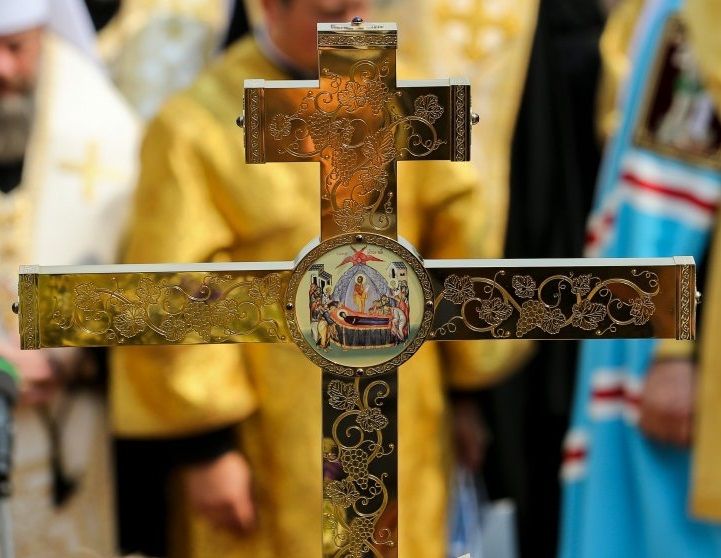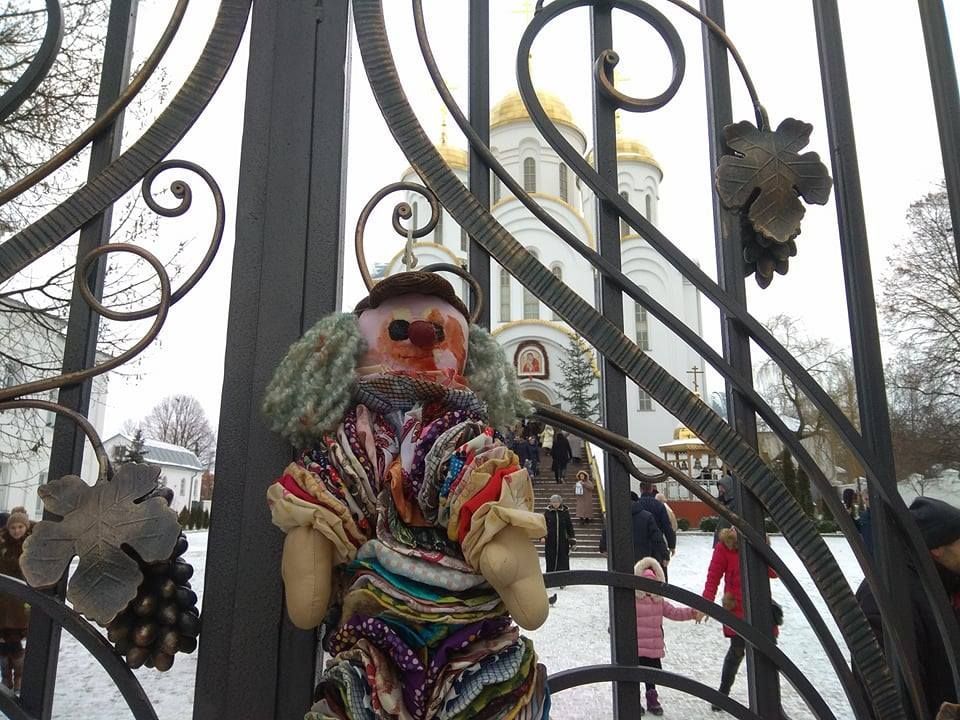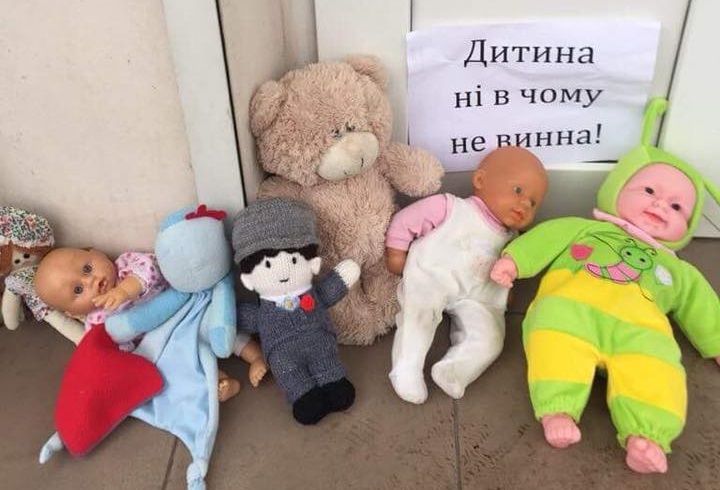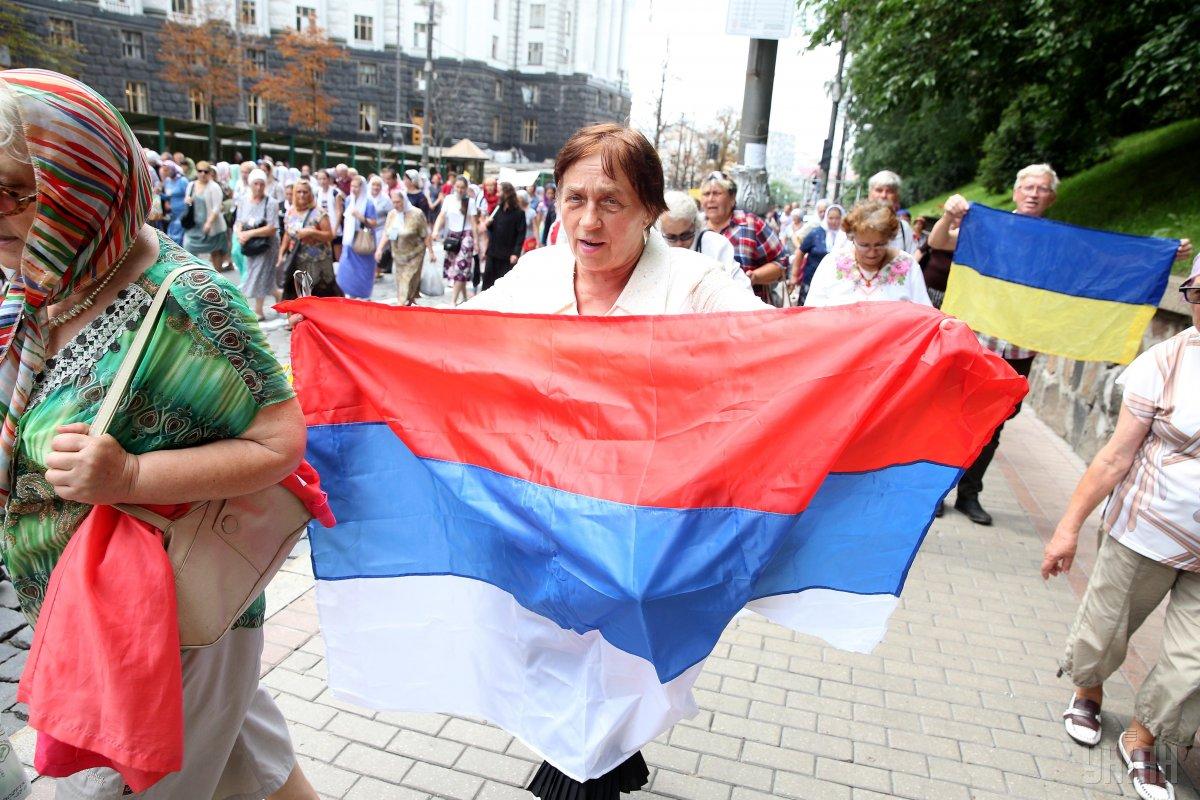
Tomos of autocephaly: Should Ukraine expect provocations from Moscow Patriarchate and what should be done about it
The Moscow Patriarchate is gradually losing Ukraine. Among other things, this is evidenced by a rather inert reaction to statements of the opponents of the "new unified church" idea – namely the Russian Orthodox Church and the Ukrainian Orthodox Church of the Moscow Patriarchate in the traditionally more pro-Russian regions - Kharkiv, Zaporizhia, and Odesa. At the same time, pro-Russian priests are taking a far more aggressive stance.
The Synod of the Ecumenical Patriarchate, which will determine the date when the Unification Council will convene in Ukraine to further be granted Tomos of autocephaly, is being held in Constantinople on Nov 27-29. But today we can already say that the Moscow Patriarchate, which is vehemently resisting the autocephaly of the Ukrainian Orthodox Church, is gradually losing its flock, even in the traditionally more “pro-Russian” regions.
Several factors contribute to this. First, this is about a move by the Russian Orthodox Church to sever ties with Constantinople – a step far from being perceived as adequate (or Christian). It raised brows of even the most ardent parishioners. Secondly, it's about the behavior of some priests of the UOC-MP, blindly following instructions from Moscow, while actually losing support from their flock in Ukraine. And, thirdly, it's about the traditional passive stance of the population, including the congregation of the UOC-MP, in the above-mentioned regions.
However, this does not mean that the corresponding work has halted in these regions toward those loyal to the aggressive appeals of the pro-Russian church and those who attend churches only on big holidays.

Non-christian behavior
Perhaps residents of Zaporizhia region are shifting away from the Moscow Patriarchate at the fastest pace. As early as last spring, when Zaporizhia-based clerics of the UOC MP traveled to the outskirts of Mariupol, Donetsk region, to "support the fighting spirit of their countrymen" in one of the military units of the National Guard, the officer told the priests that Ukraine defenders of Ukraine did not wish to meet with “Moscow” priests.
Clerics tried to complain but to no avail.
It was Father Viktor, a clergyman of the Ukrainian Orthodox Church of the Kyiv Patriarchate, who told UNIAN this story. At that time, he was a chaplain in that unit. According to him, representatives of various confessions and religious organizations would come to visit the military, and the doors of the unit would always be open to everyone – except the Moscow Patriarchate.
In the winter of 2018, some of the soldiers who in 2017 refused to meet with the UOC-MP priests were close to making Zaporizhia another hot spot of hostilities...
On December 31, 2017, a two-year-old child died in a fatal accident in Zaporizhia. During the funeral, the priest, who was invited to perform a rite of burial, asked if the boy had been baptized. Having learned that he was baptized in the church of the Kyiv Patriarchate, the cleric refused to perform the ceremony, branding the UOC-KP a self-styled church. The grieving mother knelt before him, begging for understanding, but the priest was unshakable as he simply left the funeral. Eventually, a priest of the Kyiv Patriarchate was invited, who conducted a rite of burial...
The story caused shock waves across Ukraine. In a matter of hours, a flash mob was organized in social networks: throughout the country, people would bring teddy bears to the temples of the UOC-MP as a reminder of the deceased boy. And everywhere the reaction was the same: the staff collected toys and defiantly threw them away.
In Zaporizhia, this provoked a new round of scandal. A Ukrainian soldier and his local volunteer friend brought the toys to one of the churches and, upon seeing a priest's attempt to throw them away, entered into an altercation. Shortly, a group of men arrived at the scene and brutally assaulted the two men.
Later it turned out that the attackers were members of the "Orthodox Union Radomir" public organization. Subsequently, these same people would "ensure public order" at the Russian propaganda-inspired "Victory Regiment" march and the anniversary of the end of the Battle of Stalingrad ...

Fighting for property, not for flock
The story has become a kind of "point of no return" in the confrontation between the clergy and the Zaporizhia public. Local veterans urged their comrades-in-arms neither to respond to violence with violence nor take radical measures. Local police even took under protection the temples of the UOC-MP in the city.
But while adequate people were trying to smooth out the conflict and prevent a serious confrontation in the city, the situation was being “heated up” by Bishop Luka of Zaporizhia and Melitopol (UOC-MP). He would publicly brand the Kyiv Patriarchate "impostors," justifying the move of that priest who refused to perform a service.
Luka has to this day remained quite categorical in his statements, especially in matters of Ukraine receiving Tomos of autocephaly: “Now global redistribution is underway, a lot is changing ... And now, when Russia began to develop economically, it is very beneficial for someone to crush it, it is advantageous to play against it. This is life without God,” says Luka.
A Zaporizhia-based religious expert Ilya Bey says that Luka does not limit himself to such statements. According to him, during sermons, he is warning people of the upcoming bloodshed that he says will be a result of obtaining a tomos.
“The moods of the congregation depends on Luka. Today, he is setting people up to accept the fact that there may be bloodshed, that the "junta" has seized the church, and so on. Recently, the UOC-MP conducted a very manipulative “poll,” whose results show what ideas are being channeled to parishioners,” says Ilya Bey.
Thus, according to that fake “poll”, “more than 97% of believers are against any changes, both in canonical status and in ritual matters”, as regards the legal status of the church and the language of worship.
Ilya Bey does not rule out provocations in Zaporizhia once Ukraine obtains the tomos from Constantinople. “It is clear that Luka does not take such decisions, but various provocations may be beneficial to Russia. This may be, for example, explosions in temples. Suppose the community decides not to reunite with the new church and something bad happens… Then they will say: “Here! This is the revenge of the fierce Banderites!” Or, say, if they decide to join the new church, something bad could also happen. They will say: “Here! Once you switched to those fierce Banderites, see how it ended?” But everything depends only on what decision will be made in Moscow, and how the Russian intelligence services will act as well as ours – whether they can foresee and prevent such scenarios,” the expert says.
However, despite Luka's efforts to convince parishioners that the UOC-MP is united and inviolable, things within its framework are a bit different. According to Bishop Fotiy of Zaporizhia and Melitopol (UOC-KP), to date, part of the “Moscow” bishops have already announced their intention to join the new United Orthodox Church. “There is evidence that some part of the episcopate of the MP in Ukraine declared their will to join the United Church, signing an appeal to the Ecumenical Patriarch for the granting of autocephaly. So far, it is about 10 people, whose names are not disclosed for security reasons... In the future, about a quarter of the episcopate could join the new church,” says Fotiy.
He also does not rule out an option where parishes subordinate to his “Moscow” counterpart Luka will also want to join the new United Church. And, in order to avoid this, today, the priests are putting pressure on their flock. "The Zaporizhia Diocese of the MP takes a series of measures to prevent the transition of its communities to the United Local Church. And this is situation in almost all regions. The most common way is to transfer premises from the community to which they belong to the diocesan administration. And this means that even if the community decides to switch to the Unified Church, the UOC-MP will declare: 'Sorry, but the premises are not yours, they are our'."
In turn, the local SBU office and local authorities categorically stated that they would not allow any provocations. Officials and law enforcers in Kharkiv region share the same opinion. Such confidence is due to the fact that open conflicts on religious grounds are not traditional for the region.
At the same time, it is worth noting that in Kharkiv region, the Moscow Patriarchate has a dominant position – most Orthodox religious communities there are part of the UOC-MP. At the same time, the pro-Russian church enjoys support of local authorities. That is why the UOC-MP has the largest and oldest temples, while new ones are being actively built (according to the diocese, in November alone, two new temples were consecrated).
In addition, Russian businessman Pavel Fuks (currently living in Ukraine) and Russian Duma Defense and Security committee member Alexander Shishkin (who voted for deployment of Russian troops into Ukraine, actively participated in the construction of new churches. And, at the same time, these projects have always been actively supported by Kharkiv Mayor Hennady Kernes.
Moreover, in August 2014, the Kharkiv City Council, at the request of the diocese, awarded both Russians the title “Honorary Citizen of Kharkiv” for charitable contributions to the construction of temples...

Faithful to Russia
In early November, the clergy of the Kharkiv Diocese of the UOC-MP held a meeting to attest to their primate (and his position on the autocephaly of the Ukrainian church) Metropolitan Onufriy. In late October, a similar meeting with the same agenda was held in the Odesa Diocese of the UOC-MP.
By the way, unlike the Kharkiv authorities, Odesa leaders decided to hold a meeting with Metropolitan of the local UOC MP Agafangel and bishop of the Odesa and Baltiya UOC KP Pavel, with the participation of the head of the SBU in Odessa region, Oleksandr Dovzhenko, local police chief Dmytro Holovin and regional prosecutor Oleh Zhuchenko. Representative of the Regional State Administration told UNIAN that the participants discussed issues of state-church ties, as well as ways of harmonizing interfaith relations...
“The meeting allowed assuming that, despite the predominance of the MP in the territory of our region (especially in its southern part) and the weakness of all local opponents, there will be no escalation. It seems that 'all levels' aim at maintaining calm in the region. At the same time, a lot depends on the position of the metropolitan, widely known for his obvious focus on Russia,” a representative of the Odesa Regional State Administration, who attended the meeting, told UNIAN.
Indeed, in certain circles, the authority of Agafangel, 80, (Oleksiy Savvin) is quite large. The cleric once even was a people's deputy of Ukraine (1990-1994), and from 2006 until recently he was a deputy of the Odesa regional council as a member of the pro-Yanukovych “Party of Regions”.
According to one of the Odesa-based religious scholars, at the international festival “Faith and Word” in late October, the press service of the Odesa diocese won in the nomination “Best Facebook profile of a diocese.” The award ceremony took place in a resort outside Moscow.
Meanwhile, the official YouTube channel of the Zaporizhia diocese is among TOP3 diocesan resources on the territory of the canonical responsibility of the Russian Orthodox Church.
“Such moments, to a certain extent, are indicative ... Indeed, besides Agafangel’s position, of great importance is what efforts the Kremlin will take to destabilize Odessa region, which is seen as a certain springboard for provocations that could later spread throughout the country,” the scholar notes.
According to him, the forms and methods of “mobilization” of youth the local priests of the MP employ are somewhat alarming. For example, in October, on the territory of the Holy Dormition Monastery, Agafangel blessed members of the Java motorcycle club established at the church (how far is it until something similar to Putin's Night Wolves is created in Odesa?).
By the way, the mentioned monastery, located on the Black Sea coast, is the residence of the Patriarch of Moscow and All Russia. The last time Kirill visited the place was in 2010. However, even back then, he declared: “May God's blessing protect this holy temple, the Odesa diocese and the whole of Novorossiya” ... Even back then, the word “Novorossiya” alerted local political scientists. As it turned out later, that was for good reason. There was nothing accidental in Kirill's statement after all.
In this regard, despite the fact that real Christians oppose violence and aggression, and most parishioners of any denomination are not at all against the emergence of a single church in Ukraine, we should not forget that it's not altruistic priests who influence their congregations. And, given that in the above-mentioned regions of religious communities, the presence of the UOC-MP is many times larger than that of the UOC-KP, local authorities and law enforcers should be on their guard to prevent incitement of hatred after the Synod of the Ecumenical Patriarchate and the December Unification Council in Ukraine are held.
UNIAN

